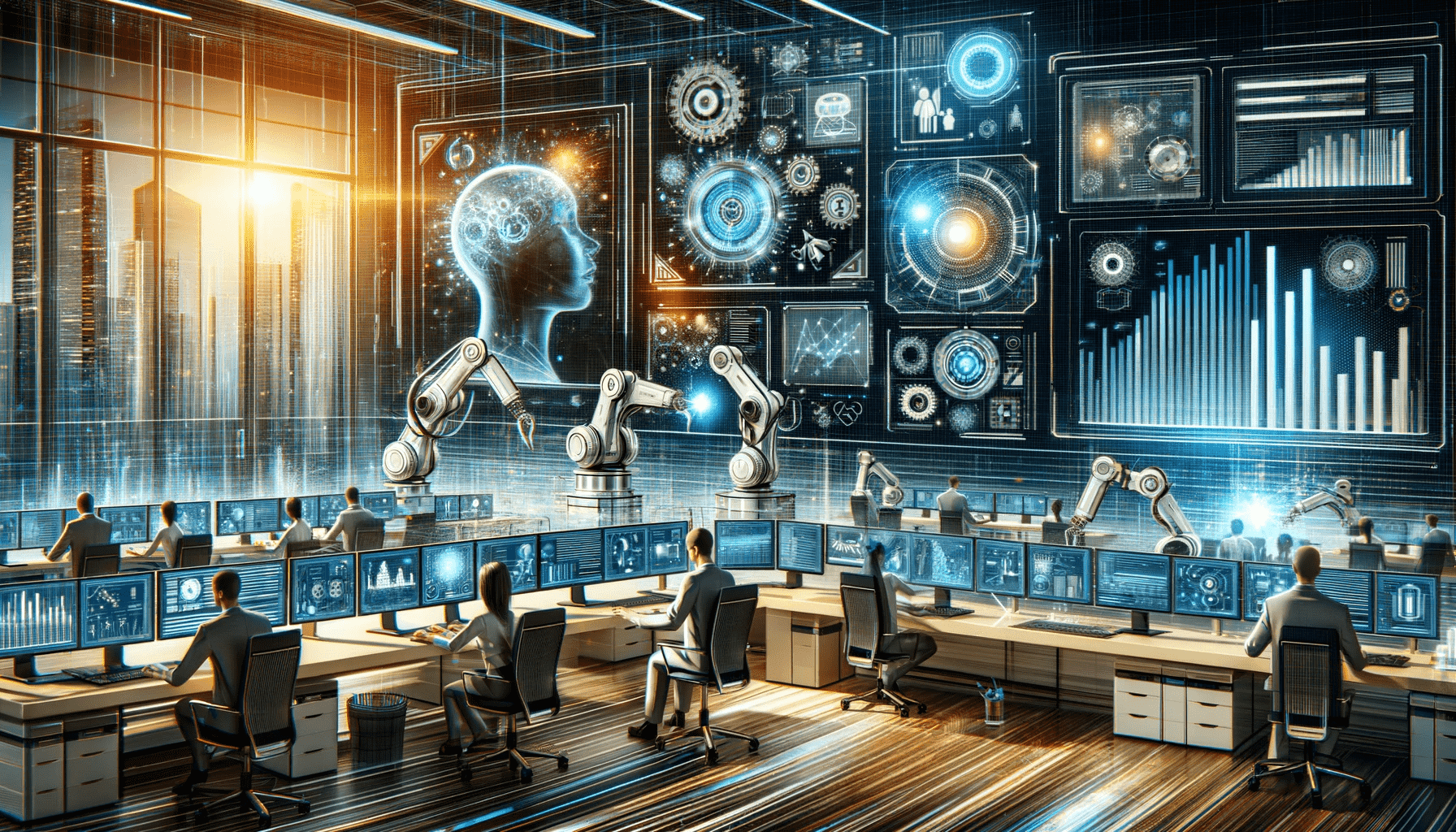
Overview of workflow automation
Workflow automation refers to the process of automating repetitive and manual tasks within a business by using technology. It involves the use of various software tools and systems to streamline and optimize business processes, saving time and improving efficiency. This technology-driven approach allows organizations to eliminate manual errors, reduce operational costs, and increase productivity.
Importance of streamlining business processes
Efficient business processes are crucial for the success of any organization. Streamlining these processes not only improves productivity but also helps in achieving higher customer satisfaction. By eliminating manual tasks and reducing human intervention, workflow automation allows businesses to focus on more strategic activities. It provides a standardized and consistent workflow, reducing the chances of errors and delays. Furthermore, automation enables organizations to handle larger workloads and scale their operations effectively.
Enhancing efficiency with automation
Workflow automation enhances efficiency by automating repetitive tasks, resulting in faster and error-free execution. It saves immense time and effort, which can be utilized for core business activities. Automation eliminates the need for manual data entry, reduces paperwork, and minimizes delays caused by waiting for approvals or actions from other stakeholders. Moreover, automation ensures that tasks flow seamlessly from one person to another, without any bottlenecks. This leads to better coordination and collaboration among team members, as everyone is working on the same platform and has access to real-time data. It also allows businesses to track the progress of tasks, identify bottlenecks, and make necessary adjustments, thus improving overall efficiency.
Integration of AI in workflow automation
Artificial Intelligence (AI) plays a significant role in enhancing workflow automation. AI technologies, such as machine learning and natural language processing, enable systems to understand and interpret large amounts of data. This allows businesses to automate complex tasks that require cognitive abilities, such as decision-making and problem-solving. AI-powered workflow automation systems can analyze data patterns, predict future outcomes, and make intelligent decisions. These systems can also learn from user interactions and improve their performance over time. By incorporating AI, businesses can achieve a higher level of automation and efficiency, enabling them to stay competitive in today's rapidly evolving markets.
Understanding the concept of AI
AI refers to the simulation of human intelligence in machines that are programmed to think and learn like humans. It involves various subfields such as machine learning, natural language processing, computer vision, and robotics. AI systems are designed to analyze and interpret vast amounts of data, recognize patterns, and make decisions based on this analysis. Machine learning, a subset of AI, allows systems to learn from experience without being explicitly programmed. It enables systems to adapt and improve their performance by continuously analyzing data and making adjustments. Natural language processing, another AI technology, enables computers to understand and interpret human language, enabling communication and interaction between humans and machines.
Benefits of AI in streamlining processes
The integration of AI in workflow automation brings several significant benefits. Firstly, AI systems can handle complex and cognitive tasks that are traditionally performed by humans. This frees up human resources, allowing them to focus on more creative and strategic activities. AI-powered automation also reduces errors and ensures consistent and accurate results, leading to improved quality of output. Furthermore, AI can analyze large volumes of data in real-time, identifying patterns and anomalies that may not be apparent to humans. This enables businesses to make data-driven decisions and take timely actions. AI-based automation systems can also adapt and learn from new information, continuously improving their performance and efficiency.
Examples of AI-powered automation
There are numerous examples of AI-powered automation across various industries. One such example is the customer service industry, where AI-powered chatbots assist customers in finding information, answering queries, and resolving issues. These chatbots use natural language processing to understand and respond to customer interactions, eliminating the need for human intervention for routine inquiries. In the healthcare industry, AI is used for radiology image analysis. AI algorithms can analyze medical images, such as X-rays and MRIs, to detect abnormalities and assist doctors in making accurate diagnoses. This not only speeds up the diagnostic process but also improves the accuracy of results. Another example is the finance industry, where AI algorithms are used for fraud detection. These algorithms can analyze vast amounts of financial data in real-time, identifying patterns and anomalies associated with fraudulent activities. This enables businesses to take immediate action and prevent financial losses.
Challenges in implementing AI in workflow automation
Despite the numerous benefits, implementing AI in workflow automation comes with its own set of challenges. One major challenge is the availability and quality of data. AI systems rely on large amounts of quality data to train their algorithms and make accurate predictions. However, ensuring the availability of relevant and reliable data can be a difficult task. Another challenge is the complexity and cost associated with developing and integrating AI systems. Building and training AI models require expertise in both AI and domain knowledge, making it a resource-intensive process. Additionally, integrating AI systems with existing infrastructure and legacy systems can be challenging and time-consuming. Ethical considerations and data privacy are also important challenges that need to be addressed when implementing AI in workflow automation. AI systems must be designed and governed in a way that ensures fairness, transparency, and accountability. The protection of sensitive customer data and compliance with privacy regulations is of paramount importance.
The role of technology in driving automation
Technology plays a crucial role in driving automation across industries. Advancements in computing power, data storage, and connectivity have enabled businesses to harness the power of automation on a large scale. Cloud computing and Software-as-a-Service (SaaS) solutions have made automation accessible and affordable for businesses of all sizes. Furthermore, the integration of AI technologies, such as machine learning and natural language processing, has revolutionized workflow automation. These technologies enable businesses to automate complex cognitive tasks, reducing the dependency on human intervention. Moreover, the emergence of low-code and no-code platforms has made it easier for non-technical users to automate their workflows without extensive coding knowledge. These platforms provide drag-and-drop interfaces and pre-built templates, allowing users to build and deploy automated workflows quickly and efficiently.
Future trends in AI and workflow automation
The future of AI and workflow automation is promising. As technology continues to advance, AI systems will become more intelligent, autonomous, and capable of handling complex tasks. Natural language processing and computer vision technologies will improve, enabling greater interaction and understanding between humans and machines. AI-powered automation will also penetrate various sectors, including manufacturing, logistics, and education. Intelligent robotic process automation (RPA) will become more prevalent, allowing businesses to automate not only digital tasks but also physical tasks performed by robots. Furthermore, as AI systems become more sophisticated, explainable AI will gain importance. Explainable AI focuses on making AI systems transparent and understandable, enabling users to understand how decisions are made and providing insights into the underlying algorithms. This will help build trust and confidence in AI systems, increasing their adoption across industries. In conclusion, AI-powered workflow automation offers significant benefits to organizations in terms of efficiency, productivity, and accuracy. By leveraging AI technologies, businesses can streamline their processes, eliminate errors, and make data-driven decisions. However, implementing AI in workflow automation comes with challenges, including data availability, system integration, and ethical considerations. Nevertheless, with advancements in technology and the future trends in AI, the potential for further improvements in workflow automation is vast.

